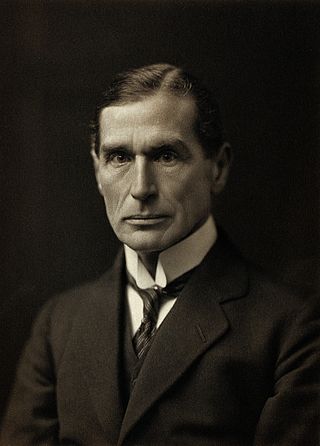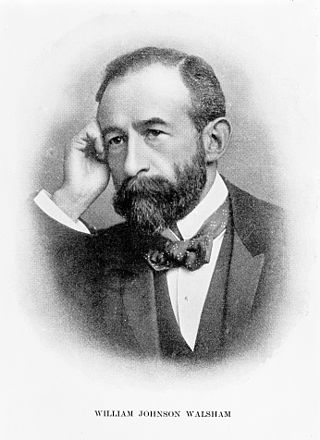
Christopher Heath FRCS (13 March 1835 – 8 August 1905) was an English anatomist and general surgeon [1] [2]

Christopher Heath FRCS (13 March 1835 – 8 August 1905) was an English anatomist and general surgeon [1] [2]
Born in London on 13 March 1835, he was the son of Christopher Heath, minister in the Catholic Apostolic Church, by Eliza Barclay his wife. He entered King's College School in May 1845, and after apprenticeship to Nathaniel Davidson of Charles Street, Manchester Square, began his medical studies at King's College, London, in October 1851. Here he gained the Leathes and Warneford prizes for proficiency in medical subjects and divinity, and was admitted an associate in 1855. [3]
From 11 March to 25 September 1855 Heath served as hospital dresser on board HMS Imperieuse, during the Crimean War. He became M.R.C.S. England in 1856, and F.R.C.S. in 1860. He was appointed assistant demonstrator of anatomy at King's College, and served as house surgeon at King's College Hospital to Sir William Fergusson from May to November 1857. In 1856 he was appointed demonstrator of anatomy at Westminster Hospital, where he was made lecturer on anatomy and assistant surgeon in 1862. In 1858 he was consulting surgeon to the St. George and St. James Dispensary; in 1860 he was appointed surgeon to the West London Hospital at Hammersmith, and in 1870 he was surgeon to the Hospital for Women in Soho. Meanwhile, in 1866 he was appointed assistant surgeon and teacher of operative surgery at University College Hospital, becoming full surgeon in 1871 on the retirement of Sir John Eric Erichsen, and Holme professor of clinical surgery in 1875. He resigned his hospital appointments in 1900, when he was elected consulting surgeon and emeritus professor of clinical surgery. [3]
At the Royal College of Surgeons Heath was awarded the Jacksonian prize in 1867 for his essay upon the Injuries and Diseases of the Jaws, including those of the Antrum, with the treatment by operation or otherwise. He was a member of the board of examiners in anatomy and physiology (1875–1880), an examiner in surgery (1883–1892), and in dental surgery (1888–1892), and was member of the council (1881–1897). He was Hunterian professor of surgery and pathology (1886-87), Bradshaw lecturer in 1892, and Hunterian orator in 1897, when he chose as his subject "John Hunter considered as a great Surgeon". He succeeded John Whitaker Hulke as president of the college on 4 April 1895, and was re-elected for a second term. [3]
In 1897 Heath visited America to deliver the second course of Lane Medical Lectures recently founded at the Cooper Medical College in San Francisco. During this visit, McGill University of Montreal made him hon. LL.D. He was president of the Clinical Society of London in 1890-1, a fellow of King's College, London, and an associate fellow of the College of Physicians, Philadelphia. He lived for many years at 36 Cavendish Square, a house which is now rebuilt, and died there on 8 August 1905. He was known as teacher of both anatomy and surgery, and a tough-minded controversialist. [3]
Heath's works, all published in London, were: [3]
Heath edited the Dictionary of Practical Surgery, in 2 vols. 1886. [3] [4]
A marble bas-relief portrait by Hope Pinker commemorated Heath in the hall of the medical school buildings of University College Hospital. [3]
Heath married (1) Sarah, daughter of the Rev. Jasper Peck; and (2) Gabrielle Nora, daughter of Captain Joseph Maynard, R.N., and left a widow, five sons, and one daughter. [3]

The Royal College of Surgeons of England is an independent professional body and registered charity that promotes and advances standards of surgical care for patients, and regulates surgery and dentistry in England and Wales. The college is located at Lincoln's Inn Fields in London. It publishes multiple medical journals including the Annals of the Royal College of Surgeons of England, the Faculty Dental Journal, and the Bulletin of the Royal College of Surgeons of England.

Sir William Macewen, was a Scottish surgeon. He was a pioneer in modern brain surgery, considered the father of neurosurgery and contributed to the development of bone graft surgery, the surgical treatment of hernia and of pneumonectomy.

Richard Quain was an English anatomist and surgeon, born at Fermoy, Ireland, a brother of Jones Quain. He studied medicine in London and in Paris. He was appointed demonstrator in 1828 and professor of anatomy in 1832 at the University of London, resigning in 1850, and assistant surgeon in 1834 and surgeon in 1848 to the North London Hospital, from which he resigned in 1866. He was president of the Royal College of Surgeons in 1868.
Christopher Heath (1802–1876) was an English minister of the Catholic Apostolic Church.
Charles Stewart was an English zoologist and comparative anatomist. He was elected a Fellow of the Royal Society on 4 June 1896, and he was the president of the Linnean Society from 1890 to 1894.

Harold Ellis, CBE, Mch, FRCS is an English retired surgeon. He was Emeritus Professor of Surgery in the University of London and most recently a professor in the Department of Anatomy & Human Sciences at the King's College London School of Medicine. He qualified as a doctor from the University of Oxford in July 1948, the same month the National Health Service began. From 1950 to 1951 he undertook national service as a captain in the Royal Army Medical Corps, afterwards continuing his training as a surgical registrar in London, Sheffield and Oxford before taking up a post as senior lecturer in the University of London. In 1962, he took up the foundation chair of surgery at the Westminster Hospital, a post which he held until his retirement from practice in 1989. After a stint teaching anatomy in the University of Cambridge, he took up his present position in 1993.

Sir Frederick Treves, 1st Baronet, was a prominent British surgeon, and an expert in anatomy. Treves was renowned for his surgical treatment of appendicitis, and is credited with saving the life of King Edward VII in 1902. He is also widely known for his friendship with Joseph Merrick, dubbed the "Elephant Man" for his severe deformities.

Mount House School is a private day school for pupils from 11 to 18. The school is co-educational and is situated in Monken Hadley, in the London Borough of Barnet. It was previously the Architectural Association School between 1940–45; and then St Martha’s Catholic School for Girls was founded in 1947 at Mount House from the mid-20th Century until 2017.
The Hunterian Oration is a lecture of the Royal College of Surgeons of England, named in honour of pioneering surgeon John Hunter and held on his birthday, 14 February, each year.

Sir Hugh Lett, 1st Baronet, was a British surgeon with a special interest in urology and headed the London Hospital's genito-urinary department for many years.
Sir Victor Ewings Negus, MS, FRCS was a British surgeon who specialised in laryngology and also made fundamental contributions to comparative anatomy with his work on the structure and evolution of the larynx. He was born and educated in London, studying at King's College School, then King's College London, followed by King's College Hospital. The final years of his medical training were interrupted by the First World War, during which he served with the Royal Army Medical Corps. After the war, he qualified as a surgeon and studied with laryngologists in France and the USA before resuming his career at King's College Hospital where he became a junior surgeon in 1924.

John Birkett, F.R.C.S. F.L.S. (1815–1904) was an English surgeon and member of the Linnean Society of London who was an early specialist on breast disease, including breast cancer, and an early advocate of histology. He published a book on breast disease in the mid-nineteenth century.

Arthur Henry Cheatle CBE was an English surgeon who made important contributions to understanding of the anatomy and diseases of the mastoid region.
Urban Pritchard was a British otologist who made important contributions to understanding of the organ of Corti.

Sir Henry Greenway Howse was an English surgeon, sometime President of the Royal College of Surgeons.

Timothy Holmes FRCS was an English surgeon, known as the editor of several editions of Gray's Anatomy.
Sir Samuel Squire Sprigge was an English physician, medical editor, and medical writer.
Charles Richard Box (1866–1951) was an English physician, surgeon, and anatomist.

John Percy Lockhart-Mummery FRCS, was a British surgeon at St Mark's Hospital, London, who devised a classification of rectal cancer and described familial polyposis which led to the formation of the polyposis registry. He was the author of several books, including Diseases of the Rectum and Colon and their Surgical Treatment (1923), The Origin of Cancer (1934), and After Us, or the World as it Might Be (1936). His work on colorectal surgery earned him the nickname "King Rectum".

William Johnson Walsham was an English surgeon.
![]() This article incorporates text from a publication now in the public domain : Lee, Sidney, ed. (1912). "Heath, Christopher". Dictionary of National Biography (2nd supplement). Vol. 2. London: Smith, Elder & Co.
This article incorporates text from a publication now in the public domain : Lee, Sidney, ed. (1912). "Heath, Christopher". Dictionary of National Biography (2nd supplement). Vol. 2. London: Smith, Elder & Co.